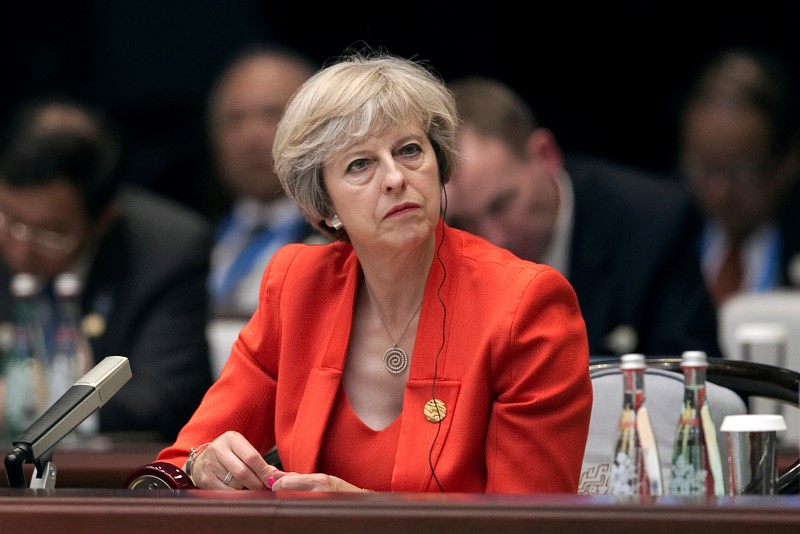By William James
HANGZHOU, China (Reuters) - British Prime Minister Theresa May rejected a "points-based" system to screen immigrants, setting up a potential conflict with Brexit campaigners in her government who promised to bring in Australian-style controls over EU migrants.
May, who favoured staying in the European Union but has pledged to deliver on the June 23 referendum vote by steering Britain out of the bloc, said such systems were difficult to manage and there was no "silver bullet" on immigration.
May has made clear that there will have to be some controls over immigration but has yet to say how they will work - a crucial issue for employers and for negotiations with the EU over future British access to the European market.
"What the British people voted for on the 23rd of June was to bring some control into the movement of people from the European Union to the UK," she told reporters on Monday after a two-day summit of leaders from G20 nations in China.
"A points-based system does not give you that control," May said. "I want a system where the government is able to decide who comes into the country. I think that's what the British people want."
Australia vets immigrants according to their occupation, qualifications and other factors but May said that points-based systems were open to abuse and did not give the government full control over who enters the country.
May's comments offer the first glimpse into her stance on the hardest question thrown up by the referendum: how to tighten border controls with the EU without losing access to its single market.
Britain's 27 partners are so far adamant that it cannot enjoy full trade benefits unless it continues to let in EU nationals as before.
BREXIT LIGHT?
At her first major international summit since becoming prime minister, May gave few details about when the formal Brexit divorce procedure would begin.
"I won't be triggering it before the end of the year. I haven't set a date when it is going to be triggered but I am conscious that the British people will want to see us actually putting their decision into practise," May said.
She believed the process would be a smooth as possible and after Brexit, Britain would have "some control" over the movement of EU nationals to the UK.
In a sign of the extent of international concern over the impact of Brexit, Japan published a 15-page report setting out dozens of its requests of Britain and the EU including maintaining access to workers from the EU and UK.
Ahead of a meeting with Chinese President Xi Jinping, May said Britain was enjoying a golden era in ties that would not be derailed by her decision to pause a part-Chinese funded $24 billion nuclear power station project at Hinkley Point.
"Our relationship with China is about more than Hinkley," May said. "We will be continuing that global strategic partnership with China. It is a golden era."
"SOME CONTROL"
May's comments on immigration risk upsetting key members of the team she assembled in July to deliver an EU exit that protects Britain's global standing and carves out a new role for the country at the vanguard of global free trade.
Foreign minister Boris Johnson and trade minister Liam Fox were part of a 'Brexit' camp that argued that voting to leave the European Union would free Britain from the duty to admit all EU nationals who want to live and work here, enabling it to cut immigration.
Speaking in June before he took over the foreign ministry, Johnson - figurehead of the Leave campaign and May's one-time rival for the prime minister's job - said a points-based system could bring back democratic control and better meet businesses' needs.
May's words will fuel fears among voters and Eurosceptic lawmakers that having a pro-Remain prime minister in charge will result in a watered-down version of Brexit that does not represent what people voted for.
"I'm worried," Nigel Farage, one of the most prominent Brexit campaigners and former head of the UK Independence Party, told BBC radio when asked about May's comments.
Farage said British voters had endorsed the idea of a points-based system of immigration that would ensure Britain took well- vetted EU immigrants.
British lawmakers will on Monday debate a public petition calling for a re-run of the EU referendum. While four million people signed the petition, May has said the referendum result was clear and that "Brexit means Brexit".

"The reason I keep saying Brexit means Brexit is precisely because it does," May said.